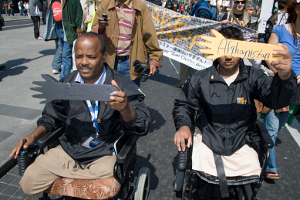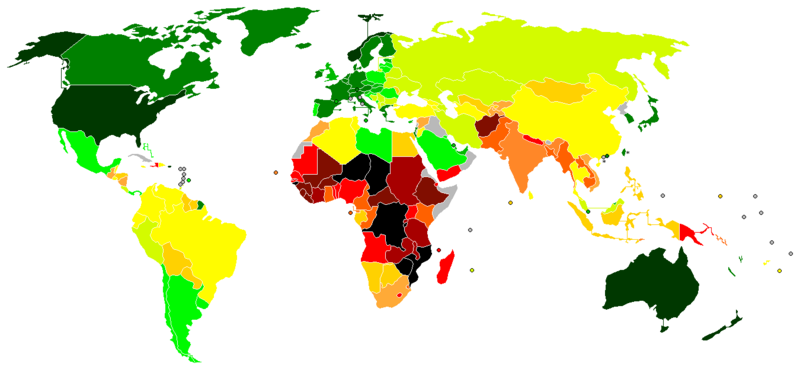Nato's war crimes in Sirte
October 03, 2011 | categories: Politics, Libya | View Comments
The National Transitional Council of Libya (NTC) announced on Friday a two-day truce in the conflict over the war-torn city of Sirte, with the alleged intent of allowing civilians to escape safely. Since then, the NTC violated their self-imposed truce in the worst way possible, namely by shelling the city's main hospital while a team of the International Committee of the Red Cross (ICRC) was visiting.
Citizens fleeing Sirte on Saturday told Reuters they knew nothing of the ceasefire, and that the shelling by NTC forces had not stopped. NATO also continued its attacks on the city throughout the weekend.
The NTC's siege of Sirte started over a month ago, when rebel leaders said that they hoped to "starve into submission" the city, and cut off the city's electricity, water and supplies. Since then, Sirte has also seen daily NATO bombings and heavy artillery shelling by NTC forces. People fleeing Sirte on Sunday said that they had to leave because they were "caught between Nato bombings and shelling by rebels," with NATO "bombing at random and often hitting civilian buildings."
The Telegraph talked to people fleeing the city who said that Nato bombing and more recently, the attacks by the NTC had turned Sirte into a "living hell". An elderly lady shouted: "They are killing our children. Why are they doing this? For what? Life was good before!"
A Pakistani migrant worker who fled Sirte said: "Nato struck one big building, Imarat Tamim, two days ago, with 12 or 13 bombs. [...] The whole building with nearly 600 flats is razed to the ground now."
Videos that emerged out of Sirte a week ago show bombed out civilian homes, schools, a radio station, and a big number of casualties, among them many women and children.
The ICRC described the humanitarian situation in Sirte as very critical after they visited the city's main Ibn Sina hospital last weekend. The aid workers reported that the hospital lacks water, electricity, and basic medical supplies. A hospital doctor told Reuters that he saw "a child of 14 die on the operating table because the power went out during the operation."
Moreover, the ICRC reported that the hospital was in fact attacked by the NTC while their team was visiting. Hichem Khadhraoui from the ICRC said that "several rockets landed within the hospital buildings while [they] were there." From the AFP report:
After the ICRC team went in, National Transitional Council fighters launched a ferocious attack with rockets, anti-tank cannons and machine gun fire from a position less than a kilometre from the hospital. Gaddafi loyalists responded with mortar and sniper fire.
"We were surprised" that the attack took place while the Red Cross team was visiting, Mr Khadhraoui said, adding that they had "contacted all parties to say we were going in."
Update: According to the ICRC, the hospital was hit various times by NATO and NTC bombings. Press TV reports on Oct 6 that NATO has carried out a new round of airstrikes against Libya, targeting a hospital in the northern town of Sirte.
Bill Van Auken writes in a recent article titled Mass killing and humanitarian disaster in NATO siege of Sirte:
At the time, the US and its NATO allies claimed that intervention was required to halt a supposedly imminent massacre of civilians in the eastern city of Benghazi. Since then, the NATO bombings and the civil war fomented by the Western powers have claimed far more lives than were ever threatened by the Gaddafi regime.
Now this resolution is being invoked to justify NATO and the militias it supports carrying out in Sirte precisely the kind of murderous siege against a civilian population that the US and the European imperialist powers pretended to be preventing.
Seumas Milne described NATO's self-proclaimed "mission to protect civilians" in Libya a "charade."
TeleSUR's Diego Marín is in Sirte and reports that the Red Cross confirmed that the city's main hospital was bombed by NATO. He also witnessed how the NTC actively hindered the Red Cross from reaching the city:
CNN has actual footage of the Red Cross convoy being forced by rebel gunfire to turn around:
Further reading:
- NATO assault on Sirte inflicts more Libyan civilian casualties, Patrick O'Connor (World Socialist Web Site), Oct 4
- Related blog posts
Nato bombs residential buildings in Libya
September 17, 2011 | categories: Politics, Libya | View Comments
Two videos uploaded today, Sep 17, show an apartment building and a hotel damaged by Nato bombing in the Libyan city of Sirte:
Another video from inside the besieged city of Sirte. The first part of this video is from Sep 16, the second part starting at 1:51 is from Sep 7:
Warning: graphic
NATO writes in their report that they attacked on Sep 16 in Sirte: 5 command & control nodes, 3 radars, 4 armed vehicles and 8 air missile systems.
It's not the first time that NATO attacked civilian buildings to later explain that the buildings had been re-purposed militarily.
On Sep 2 already, Reuters reported that electricity and water in the pro-Gaddafi town of Bani Walid had been cut off by NATO rebels. Also, most pro-Gaddafi fighters in Bani Walid were reported to be civilian volunteers.
A Sep 16 teleSUR report explains how the NATO rebel siege and blockade of Bani Walid and Sirte have resulted in critical humanitarian situations.
Sadly, hardly any of this information makes it into our mainstream media. See also:
- NATO air strikes kill 354 in Sirte - Gaddafi's spokesman, Alexander Dziadosz (Reuters), Sep 17
- Civilians join Gaddafi fighters to defend hometown, Alexander Dziadosz (Reuters), Sep 17
- Libya conflict drags on in Bani Walid, Sirte, Xinhua, Sep 17
- Rebel leaders hoping to starve Gaddafi stronghold of Sirte into submission, Rob Crilly (The Telegraph), Aug 28
- STOP Nato - rickrozoff.wordpress.com
- NATO bombing of Sirte: the new Guernica, Human rights investigations, Sep 17
Nato continues its air strikes in Libya
September 16, 2011 | categories: Politics, Libya | View Comments
Despite the declared "victory" and the fall of the Gaddafi regime in late August, NATO continues to conduct daily air strikes across Libya.
"All sorties" is the daily number of individual aircraft that NATO flew into Libya. "Strike sorties" is the number of warplanes that drop bombs and missiles.
Since the beginning of the NATO operation on Mar 31, a total of 22,817 sorties, including 8,560 strike sorties, have been conducted.
The chart is based on data published by NATO, and it will be regularly updated. You may download and reuse the chart freely using the download icon in the top-right corner. You may also want to download the raw data in TSV format.
Related: here is a map of sixteen cities that NATO attacked between Aug 22 and Sep 16:
I'm also hosting an archive of 854 articles from the Libyan state news agency's website www.jana-news.ly, some of which contain detailed accounts of Nato attacks. The site was shut down last week.
Update Sep 16: @drebha sent me this link to an online spreadsheet that also has the number of sorties, along with many more details extracted from NATO's documents.
Cluster bombs hypocrisy
April 17, 2011 | categories: Politics, Libya | View Comments

Ban Advocates from Afghanistan and Ethiopia demonstrating outside of the Convention on Cluster Munitions conference in Dublin. image source
On Friday, Human Rights Watch reported that the Libyan army had used cluster bombs in residential areas in the city of Misrata.
Some the of the newspaper articles I read about this story mentioned that there's a treaty between more than a hundred states that have agreed to ban cluster bombs.
Why ban cluster bombs? One reason is that they have a very broad area of effect, often harming civilians in attacks. Another is that they contain up to a hundred bomblets that may fail to explose initially but remain live and explode when handled, thus posing a risk similar to landmines.
Wikipedia explains that
98% of 13,306 recorded cluster munitions casualties that are registered with Handicap International are civilians, while 27% are children.
The Convention on Cluster Munitions (CCM) that bans cluster bombs was adopted in 2008. And indeed, over a hundred states have since signed the treaty, though 52 of those still have to ratify. [1]
However, a number of countries have opposed the treaty. These are mostly the same countries that produce and stockpile significant numbers of cluster munition. They include the United States, Israel, Russia, China, India, Pakistan and Brazil. Libya has also not signed the treaty.
In defense of their opposition of the ban, the US said that cluster munitions had a "clear military utility in combat" and that they actually cause less harm to civilians than some other weapons. But that's certainly nonsense. The United Nations estimate that around 40% of cluster bomblets fired by the Israeli Defense Forces in the 2006 Lebanon war failed to explode on impact. [2]
From Wikipedia:
Given that each cluster bomb can contain hundreds of bomblets and be fired in volleys, even a small failure rate can lead each strike to leave behind hundreds or thousands of [unexploded ordnances] scattered randomly across the strike area. For example, after the 2006 Israel-Lebanon conflict, UN experts have estimated that as many as one million unexploded bomblets may contaminate the hundreds of cluster munition strike sites in Lebanon.
It's also estimated that, today, around 300 Vietnamese die annually from exploding bomblet duds that date back to the Vietnam war (1955-1975).
The United States do not only decide to continue producing deadly cluster bombs which are exported to many countries in the world. They also continue to use them themselves, as recently as 2006 in Iraq. stopclustermunitions.org has four maps that detail affected countries (36), users of cluster bombs (15), producers (34), and stockpilers of cluster munitions (85).
The four most common users of cluster bombs counted by the number of wars they used them in are:
- the United States: 9 wars (since 1965)
- Israel: 5 wars (since 1973)
- Russia: 4 wars (since 1979)
- the United Kingdom: 4 wars (since 1982)
As you can see, the US and UK are among the biggest users of these horrible weapons. Yet these same countries are at the forefront of those accusing Libya of atrocities against civilians, and demanding its leader Muammar Gaddafi to step down. And the recent Human Rights Watch about the alleged use of cluster bombs by the Libyan army in Misrata report supports these accusations.
A former head of the UK's armed forces, Lord Dannatt, was quoted yesterday with regard to the cluster bomb finding:
If we thought that Gaddafi had lost the moral right to rule this country a month ago, he has lost it in the last 24 hours, that's for sure.
Following his logic, the UK government has long lost its 'moral right' to rule. Or maybe what Dannatt means is it that it's morally acceptable when it's the British military that drops cluster bombs on Arab civilian areas.
There isn't, however, much evidence to this cluster bombs story. Since the beginning of the protests, the mainstream media has been constantly pumping out similar accusations, and many of these already turned out to be false. John Pilger notes in his article from 6th April:
Statements by western officials and media that a "deranged and criminal Colonel Gaddafi" is planning "genocide" against his own people still await evidence.
Libyan government spokesman Moussa Ibrahim strongly denied the use of cluster bombs: "Absolutely no. We can't do this. Morally, legally, we can't do this." He continued to say that "the evidence would remain for days and weeks, and we know the international community is coming en masse to our country soon". [3]
A few days before the cluster bomb incident, the Libyan authorities invited a Red Cross team to Misrata to assess the situation. Also, Libya has asked for a UN fact finding mission in the past, which has now started since about a week. [4]
There is similarities here with the lead-up to the US-led invasion of Iraq in 2003.
Before the war in Iraq, a UN fact finding mission led by Hans Blix went to Iraq to find if there was indeed any "weapons of mass destruction" (WMD), the threat of which were used by the US and UK as a justification for their invasion.
Blix and his team praised a "proactive" Iraqi cooperation, yet they did not find any WMD, until they were quickly shut out of Iraq by the US when the war started. [5] [6]
In an interview on BBC TV in February 2004, Blix accused the US and British governments of dramatising the threat of weapons of mass destruction in Iraq, in order to strengthen the case for the war against the regime of Saddam Hussein. Ultimately, no stockpiles of weapons of mass destruction were found. [7]

Colin Powell's February 2003 UN meeting presentation slide showing an alleged Iraqi-ordered Aluminum Tube for Uranium Enrichment. image
Update April 21, 2011
A week ago, The Boston Globe wrote: [8]
Evidence is now in that President Barack Obama grossly exaggerated the humanitarian threat to justify military action in Libya. The president claimed that intervention was necessary to prevent a "bloodbath" in Benghazi, Libya’s second-largest city and last rebel stronghold.
But Human Rights Watch has released data on Misurata, the next-biggest city in Libya and scene of protracted fighting, revealing that Moammar Khadafy is not deliberately massacring civilians but rather narrowly targeting the armed rebels who fight against his government.
An independent group called the "British Civilians for Peace in Libya" that visited Western Libya for a week on a fact finding mission, comes to a similar conclusion. In their interim report they say they "are concerned that western media outlets are failing in their duty to report on the conflict truthfully." [9] See the Sky News article from April 19, 2011.
| [1] | 108 states on board the Convention on Cluster Munitions, Convention on Cluster Munitions official website |
| [2] | IDF commander: We fired more than a million cluster bombs in Lebanon, HAREETZ.com, 12 Sep 2006 |
| [3] | Battles for Libyan cities rage on, Al Jazeera English, 17 Apr 2011 |
| [4] | UN says its Libya human rights abuses investigation will cover all sides involved in fight, The Associated Press, 8 Apr 2011 |
| [5] | Blix welcomes accelerated cooperation by Iraq, but says unresolved issues remain, United Nations official website, 7 Mar 2003 |
| [6] | Blix takes Washington to task, CNN.com, 12 June 2003 |
| [7] | Blix doubts on Iraq intelligence, BBC News, 8 Feb 2004 |
| [8] | False pretense for war in Libya?, The Boston Globe, 14 Apr 2011 |
| [9] | British Citizens for Peace in Libya – Interim Report, Straight Talk, 19 Apr 2011 |
Libya is different
March 02, 2011 | categories: Politics, Libya | View Comments
The situation in Libya is very different to that of other Middle East and North African countries in revolt. Yet, the public opinion likes to put Libya into the same box.
Today, Libyan leader Gaddafi addressed on TV the recent developments in Libya.
You may think of the Libyan government and its eccentric leader however you want. But if you believe that Libya's uprising is similar to those in revolting neighbouring countries, then you're wrong.
What's happening in Libya is a civil war. Rebels are armed and they strategically capture cities and oil fields. This is very different to the peaceful demonstrations of millions of people that we've seen in images from Cairo.
A look at Libya's history and current state reveals that the situation in Libya is much different to that of neighbouring countries.
Libya is today arguably one of the most independent states of post-colonial Africa. It is widely accepted that Libya's welfare system is one of the best on the continent. From Wikipedia:
During the 1970s, the government succeeded in making major improvements in the general welfare of its citizens. By the 1980s Libyans enjoyed much improved housing and education, comprehensive social welfare services, and general standards of health that were among the highest in Africa.
(1969 is when Gaddafi came to power.)
In the Human Development Index, Libya is the only African state that reaches 0.75 points. It's the only green spot on the African continent for 2010:

In 1971, Libya kicked out British Petroleum. During the 70s, the state gained control of 70% of its oil production. State revenues from oil export more than quadrupled as the oil prices went up three times. And the benefitors were to a large extend the people of Libya.
Compare this to countries like Nigera, where Shell has lots of influence on the government and gets the best deals, at the cost of lots of suffering. There, welfare is virtually non-existant. Or take Saudi Arabia, where the oil revenues also benefit only a few.
And then countries like Nigeria that are practically in foreign hand and follow capitalist agendas are the ones that are opposed to the idea of an United States of Africa, which is Gaddafi's Pan-African effort with the goal of freeing more of Africa's countries from what is effectively colonialism in disguise. Surely, the recent developments in Libya will be a setback for these efforts. (See also Neocolonialism.)
NB: I'm not saying that Gaddafi is or is not unjustly using force against the people of Libya. That I can't assess. I'm merely trying to put things into perspective. [1]
In his TV appearance today, Gaddafi argued that there were no peaceful protests in Libya, as there were in Egypt or Tunisia. He said that the opposition forces are militants, and that they're are stragically targeting for the country's oil fields.
Update. See also:
- Libya rebels isolate Gaddafi, seizing cities and oilfields
- a United Nations Human Rights Council report on Libya from January 2011
- a BBC interview with Noam Chomsky from 8 March 2011 on the situation in the Arab world
| [1] | As it turns out, most claims of Gaddafi's human rights abuses turned out to be fabrications. See False pretense for war in Libya? [boston.com], Amnesty questions claim that Gaddafi ordered rape as weapon of war [independent.co.uk] and The Top Ten Myths in the War Against Libya [counterpunch.org]. |
